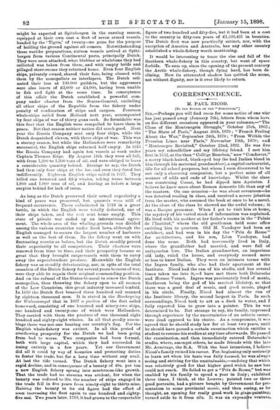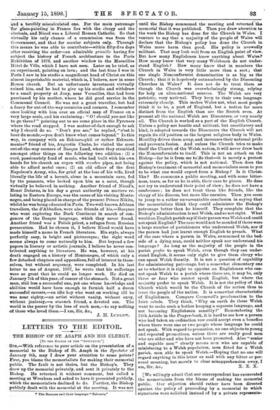ero THE EDITOR OF THE "SPECTATOR."] SIR,—Perbaps you will find
room for some notice of one who' has just passed away (January 7th), letters from whom have on five different occasions appeared in your columns,—" The Close of the Montenegrin Struggle," October 25th, 1862; "The State of Paris," August 26th, 1870; "French Feeling About the War," September 24th, 1870; "From Within the Prussian Lines near Paris," November 13th, 1870 ; and "Montenegro Revisited," October 22nd, 1892. He was five years my schoolfellow and my lifelong friend. I met him first in 1832, at the then " College Bourbon," now " Condorcet,' a merry black-haired, black-eyed boy (he had Italian blood is him through his maternal grandmother), a capital caricaturist,, idle for all school purposes, but whom I soon discovered to be not only a charming companion, but a perfect mine of all manner of odds and ends of knowledge. Whilst the class was construing Caner, he had dipped into Apuleins. I believe he knew more about Roman domestic life than any of the masters. On one occasion—he was about seventeen—he was detected reading in class, and received a severe jobation from the master, who assumed the book at once to be a novel. At the close of the class he showed me the awful volume ; it was a Basque grammar. When I got to visit him at home, the mystery of his varied stock of information was explained. He lived with his mother at her father's rooms in the "Palais de l'Institut," where the old gentleman held some office entitling him to quarters. Old M. Vaudoyer had been an architect, and had won in his day the "Prix de Rome" for architecture, and his son, Leon Vaudoyer, had done the same. Both had necessarily lived in Italy, where the grandfather had married, and were full of antiquarian lore. The Italian grandmother, an imperious old lady, ruled the house, and everybody seemed more or less to know Italian. They were on intimate terms with the Ingres family, who also had their apartment at the Institute. Nicod had the run of his studio, and has several times taken me into it,—I have met there both Delaroche and Horace Vernet. Ingres was passionately fond of music, Beethoven being the god of his musical idolatry, so that there was a good deal of music, and good music, played in his circle. Finally, Nicod had almost the ran of the Institute library, the second largest in Paris. In such surroundings, Nicod took to art as a duck to water, and I fully expected him to grow into a painter. This he was determined to be. But strange to say, his family, impressed through experience by the uncertainties of an artistic career,. were dead opposed to his choice. As a compromise, it waa agreed that he should study law for at least two years, until he should have passed a certain examination which entitles a student to resume his studies at any time afterwards. He passed the examination, and then immediately entered Delaroche'e studio, where, amongst others, he made friends with the late Mr. Armitage, the R.A. With the best intentions, I believe Nicod's family ruined his career. For, beginning only seriously to learn art when his taste was fully formed, he was always seeing and striving for the unattainable,—undoing that which was relatively good for that higher good which he saw but could not reach. He failed to get a "Prix de Rome," but was enabled by his family to spend a year in Italy; exhibited three times, I think, at the Louvre ; painted two or three good portraits, had a picture bought by Government for pre- sentation to some provincial muse:e, and then e ing, as he thought, an opening for really good work in gl -painting. turned aside to it from oils. It was an expene e venture. inid a terribly miscalculated one. For the main patronage 'for glass-painting in France lies with the clergy and the clericals, and Nicod was a Liberal Roman Catholic. So that virtually his only chance of a commission was from the Government, and that for secular subjects only. Through this means he was able to contribute—within fifty-five days after receiving the order—an admirable grisaille having for subject the history of French architecture to the Paris Exhibition of 1878, and another window to the Marseilles Hotel de Vile, which I have not seen. Later on he tried, as an experiment, painting on lava; and the last time I was in Paris I saw in his studio a magnificent head of Christ on this almost imperishable material, which is, I believe, now in some Rouen church. But an unfortunate investment virtually mined him, and he had to give up his studio and withdraw to a small property at Jouy, near Versailles, that had been purchased by his mother, where he did good service in the Communal Council. He was not a great traveller, but had a fancy for out-of-the-way countries and corners. I remember .once looking with him over an official map of France on a very large scale, and his exclaiming : " 0 ! should you not like to go there?" pointing out to me some place in the Pyrenees where the road stopped. I was matter-of-fact enough to ask why I should do so. "Don't you see," he replied, "c'eet le bout du monde,—you don't know what comes beyond." In this way, in company with an Eskuaro-phil or rather Esknaro- maniac* friend of his, Augustin Chaho, he visited the most out-of-the-way corners of Basque Land, where they stumbled amongst other things on the following two oddities : (1) a cure, passionately fond of music, who had built with his own hands for his church an organ with wooden pipes, not being able to afford metal ones ; (2) an old officer of the first Napoleon's Army, who, for grief at the loss of his wife, lived literally the life of a hermit, alone in a mountain cave, fed by the peasants, who looked upon him as a saint, though virtually he believed in nothing. Another friend of Nicod's, Henri Delarue, in his day a great authority on matters re- lating to Eastern Europe, was the cause of his visiting Monte. -negro, and being placed in charge of the present Prince Nikita, whilst he was being educated in Paris. Two well-known African travellers, the d'Abbadies, were also friends of his,—Basques who went exploring the Dark Continent in search of con- geners of the Basque language, which they never found. Another friend was a Polish priest, a refugee from Russian persecution. Had he chosen it, I believe Nicod would have made himself a name in French literature. His style, always perfectly easy, is bright and picturesque; the right word seems always to come naturally to him. But beyond a few papers in literary or artistic journals, I believe he never con- tributed anything to literature. He was, however, at his death engaged on a history of Montenegro, of which only a few detached chapters and appendices, full of interest in them- selves, but without eequency, were completed. In his last letter to me of August, 1897, he wrote that his sufferings were so great that he could no longer work. He died on January 7th of this year, of cancer of the stomach. Not a great man, still less a successful one, yet one whose knowledge and .abilities would have been enough to furnish half a dozen successful careers,—an idle boy who went on working till he was near eighty,—an artist without vanity, without envy, without jealousy,—a staunch friend, a devoted son. The world is the poorer by the loss of such men,—to say nothing of those who loved them.—I am, Sir, 86c.,
J. M. LUDLOW.



































 Previous page
Previous page